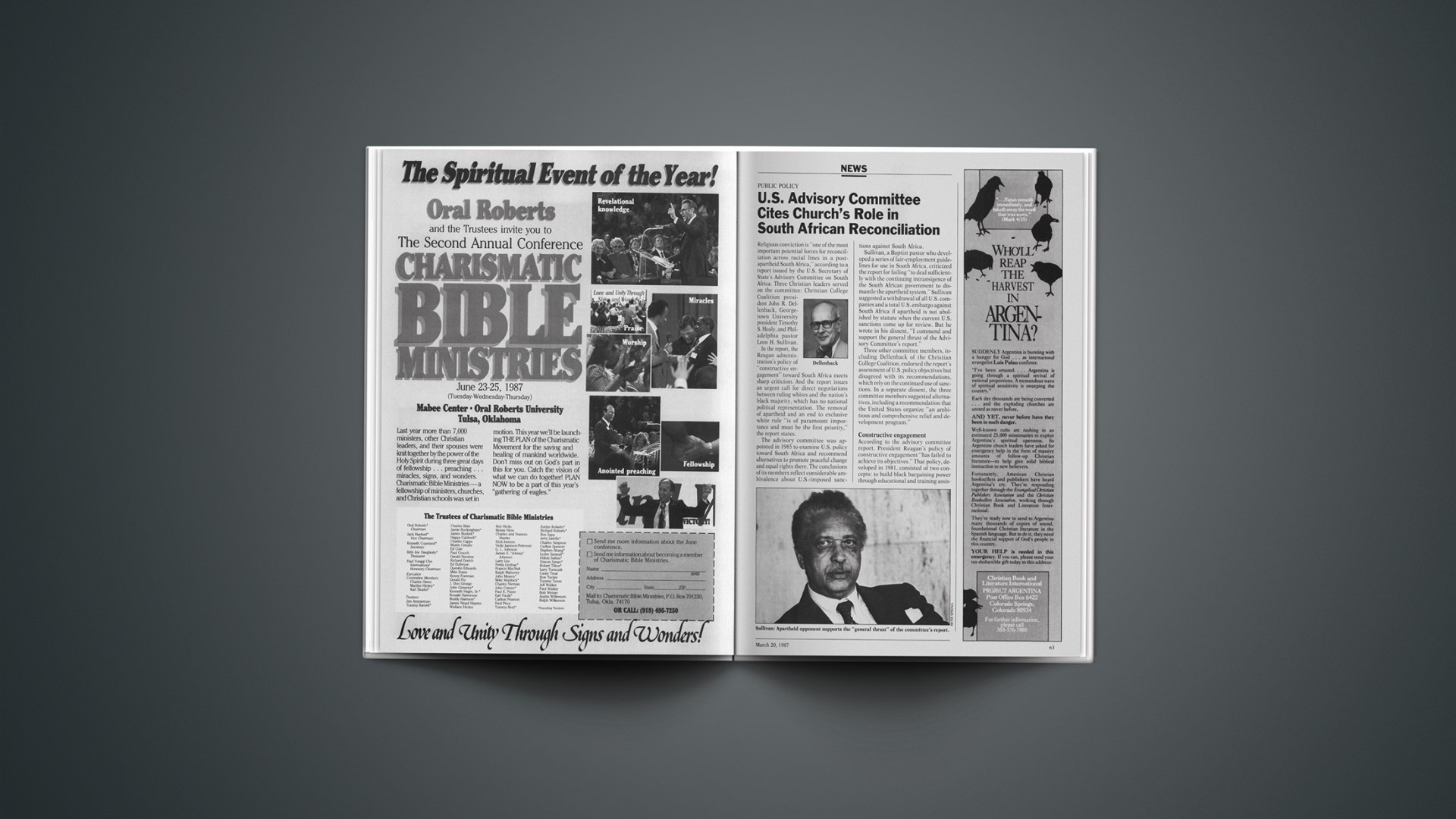Religious conviction is “one of the most important potential forces for reconciliation across racial lines in a postapartheid South Africa,” according to a report issued by the U.S. Secretary of State’s Advisory Committee on South Africa. Three Christian leaders served on the committee: Christian College Coalition president John R. Dellenback, Georgetown University president Timothy S. Healy, and Philadelphia pastor Leon H. Sullivan.
In the report, the Reagan administration’s policy of “constructive engagement” toward South Africa meets sharp criticism. And the report issues an urgent call for direct negotiations between ruling whites and the nation’s majority, which has no national political representation. The removal of apartheid and an end to exclusive white rule “is of paramount importance and must be the first priority,” the report states.
The advisory committee was appointed in 1985 to examine U.S. policy toward South Africa and recommend alternatives to promote peaceful change and equal rights there. The conclusions of its members reflect considerable ambivalence about U.S. imposed sanctions against South Africa.
Sullivan, a Baptist pastor who developed a series of fair-employment guidelines for use in South Africa, criticized the report for failing “to deal sufficiently with the continuing intransigence of the South African government to dismantle the apartheid system.” Sullivan suggested a withdrawal of all U.S. companies and a total U.S. embargo against South Africa if apartheid is not abolished by statute when the current U.S. sanctions come up for review. But he wrote in his dissent, “I commend and support the general thrust of the Advisory Committee’s report.”
Three other committee members, including Dellenback of the Christian College Coalition, endorsed the report’s assessment of U.S. policy objectives but disagreed with its recommendations, which rely on the continued use of sanctions. In a separate dissent, the three committee members suggested alternatives, including a recommendation that the United States organize “an ambitious and comprehensive relief and development program.”
Constructive Engagement
According to the advisory committee report, President Reagan’s policy of constructive engagement “has failed to achieve its objectives.” That policy, developed in 1981, consisted of two concepts: to build bargaining power through educational and training assistance programs; and to tone down public criticism of apartheid while communicating U.S. interest in change in South Africa through private, official channels.
Despite U.S. overtures, according to the report, South Africa has grown more repressive.
“Inside South Africa, government repression has intensified and a nationwide state of emergency has been put in place,” the report states. “Far-reaching media restrictions have been imposed. Thousands have been detained.”
Backers of constructive engagement object to taking a stronger stand against the South African government, citing that country’s important mineral exports and the threat of Communist influence. They compare the apartheid system with the United States’ past record of denying civil rights to blacks.
In response, the advisory committee acknowledged that the U.S. supply of chromium, manganese, and platinum—used for defense purposes—comes largely from South Africa. It also noted that a cutoff of these minerals could require the United States to increase its imports from the Soviet Union. But the report concludes that “the potential impact of such a denial [of mineral exports] is not sufficient cause to determine U.S. policy toward South Africa.”
Concerns about Soviet influence in South African opposition groups are misplaced as well, the report suggests. On the other hand, it points out that “the Soviets do stand to gain considerably … if a protracted conflict in South Africa embitters that country’s majority against the West.”
Finally, comparisons between South Africa’s apartheid system and the United States’ own civil rights struggle neglect a crucial difference, the report states. “The conflict over civil rights in the United States took place within a constitutional framework entirely absent in South Africa.”
The Church’s Role
A new U.S. policy toward South Africa, outlined in the report, would emphasize negotiations, U.S. assistance for development and education, and—if South Africa “remains intransigent”—additional sanctions such as a multilateral trade embargo. Once apartheid is dismantled, South Africa will need sustained support and assistance to build a democratic society. Toward this end, the report states, “Christian churches within South Africa and the rest of the world have a large role to play in overcoming the widening chasms of hatred, fear, and violence.”
The advisory committee recommends that U.S. churches “reach out to their sister churches and church members in South Africa with tangible offers of assistance.” The committee notes that more than 90 percent of whites and 75 percent ofs in South Africa are “church-going Christians.”
No one knows how much influence the report will have on U.S. policy. But according to a State Department source, “There is no doubt the Administration is taking it seriously.”










